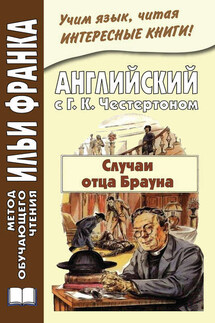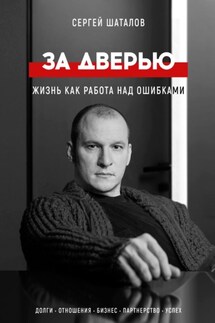Английский язык с Энтони Хоупом. Узник Зенды / Anthony Hope. The Prisoner Of Zenda - страница 41
)?” said he.
Suddenly emerging from the wood (внезапно выйдя из леса; to emerge – появляться, показываться; выходить), we came on a small and rude hunting-lodge (мы наткнулись на небольшой грубо /сколоченный/ охотничий домик; to come on – приближаться; натыкаться, наскакивать). It was a one-storey building, a sort of bungalow, built entirely of wood (это было одноэтажное строение, что-то вроде бунгало, полностью построенное из дерева). As we approached it (когда мы приблизились к нему), a little man in a plain livery came out to meet us (невысокий: «маленький» человек в простой ливрее вышел встретить нас; plain – ясный, явный; простой, обыкновенный). The only other person I saw about the place was a fat elderly woman (/кроме него/, единственным человеком, которого я увидел в этом домике: «месте», была полная пожилая женщина), whom I afterwards discovered to be the mother of Johann, the duke’s keeper (которая, как я впоследствии узнал, была матерью Иоганна, лесничего герцога).
“Well, is dinner ready, Josef?” asked the King (ну что, обед готов, Жозеф, – спросил король).
The little servant informed us that it was (маленький слуга сообщил нам, что готов), and we soon sat down to a plentiful meal (и вскоре мы сели за обильную трапезу; meal – принятие пищи, еда). The fare was plain enough (еда была довольно простой; fare – стоимость проезда; пища, стол): the King ate heartily (король ел с аппетитом: «усердно»; to eat), Fritz von Tarlenheim delicately (Фриц фон Тарленхайм с изяществом; delicate – утонченный; деликатный), old Sapt voraciously (старик Сэпт жадно; voracious – прожорливый; жадный, ненасытный). I played a good knife and fork, as my custom is (я уплетал за обе щеки, по своему обыкновению; to play a good knife and fork – есть с аппетитом; custom – обычай; обыкновение, привычка); the King noticed my performance with approval (король с одобрением следил за мной; to notice – замечать, обращать внимание; performance – исполнение; действие, поведение).
“You have to visit your disreputable cousin on the sly, have you?” said he.
Suddenly emerging from the wood, we came on a small and rude hunting-lodge. It was a one-storey building, a sort of bungalow, built entirely of wood. As we approached it, a little man in a plain livery came out to meet us. The only other person I saw about the place was a fat elderly woman, whom I afterwards discovered to be the mother of Johann, the duke’s keeper.
“Well, is dinner ready, Josef?” asked the King.
The little servant informed us that it was, and we soon sat down to a plentiful meal. The fare was plain enough: the King ate heartily, Fritz von Tarlenheim delicately, old Sapt voraciously. I played a good knife and fork, as my custom is; the King noticed my performance with approval.
“We’re all good trenchermen, we Elphbergs (мы, Эльфберги, все хорошие едоки = любители поесть),” said he. “But what? – we’re eating dry (но что же? мы едим всухомятку; dry – сухой)! Wine, Josef! wine, man (вина, Жозеф, вина, приятель)! Are we beasts, to eat without drinking (мы что, животные, чтобы есть без питья; beast – зверь; животное)? Are we cattle, Josef (мы что, скоты, Жозеф; cattle – крупный рогатый скот)?”
At this reproof Josef hastened to load the table with bottles (при этом замечании Жозеф поспешил уставить стол бутылками; reproof – выговор, упрек; to load – грузить, нагружать





